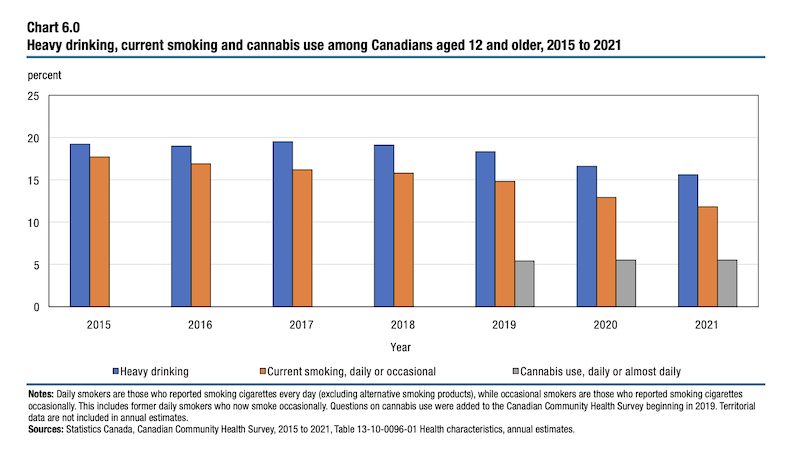Features
Cannabis preferred by poor, while affluent like to drink
Published on September 15, 2023 by David Wylie
 Photo: Adobe stock/the oz.
Photo: Adobe stock/the oz. Cannabis is the poor person’s intoxicant, according to this year’s ‘Health of Canadians’ report.
Compiled by the federal government’s bean-counting department, Statistics Canada, the 60-page Health of Canadians federal government report made public this week looks at the broader factors that affect our health.
“The percentage of daily or almost daily cannabis use and current smoking was higher among people with lower incomes, unlike heavy drinking, which was greater among people with higher incomes,” say the report’s authors.
‘Health of Canadians’ provides an overview of the state of health in this country, using the most recent data for health indicators in broad areas, including cannabis use.
It’s one of the tools used to understand the health of the population and to inform health-promoting policies, evaluate health care performance, and ensure Canadians have a good quality of life.
Who’s using cannabis in Canada?
According to the report, 5.5% of Canadians aged 12 and older reported in 2021 using cannabis daily or almost daily (five or more days per week), a percentage that has stayed stable since 2019.
Daily or almost daily cannabis use was reported more often by men and women aged 18 to 34. It was also reported more often by bisexual or pansexual Canadians (15.7%), compared with heterosexual Canadians (5.3%).
Cannabis use was higher than the national average in some Atlantic provinces (Prince Edward Island, Nova Scotia, and New Brunswick) as well as Alberta.
 Photo: Contributed/StatsCan
Photo: Contributed/StatsCan Almost all are considered addicted by StatsCan
The report says 4.7% of the 5.5% of past-year cannabis consumers had what’s considered “impaired control” over their use of cannabis.
“Daily or almost daily use of cannabis is strongly associated with adverse health outcomes, particularly related to mental health,” says the report.
“Several characteristics independently increased the likelihood of having impaired cannabis control, including being male, being aged 18 to 24, being from a lower-income household, being single or never married, having been diagnosed with anxiety or a mood disorder, or having first tried cannabis at age 15 or younger,” it says.
“Monitoring the number of Canadians at risk of developing a cannabis addiction is important, as addiction can harm health and negatively affect school performance, work, and financial well-being.”
What’s missing from this report?
StatsCan took a cynical look at how cannabis affects Canadian health in this report.
Missing from this statistical picture are the benefits, especially the medical aspects of cannabis. Hundreds of thousands of Canadians use cannabis to ease pain, restore appetite, and overall improve their quality of life.
Here are some counterbalancing articles from the oz. to consider:
Leave a comment on our Facebook page.
© Copyright 2023 Okanagan Z. | About the oz.
Report a Typo or Inaccuracy
We strive to avoid typos and inaccuracies. However, on occasion we make mistakes. We value your contributions and help in correcting them.